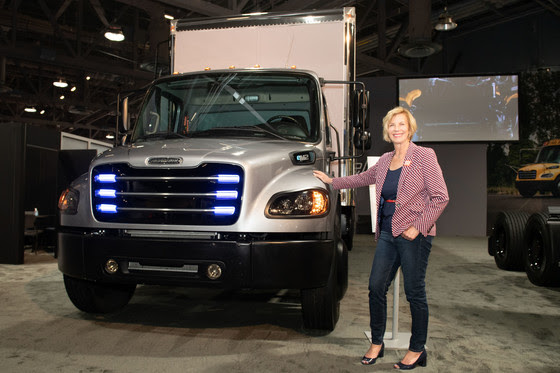Metro Dedicates $50 Million for Zero Emission Truck Program

Above: Hahn at the 2019 Advanced Clean Transportation Expo
Los Angeles, CA– Today, the Metro Board of Directors unanimously approved a motion by Supervisor Janice Hahn and co-authored by Whittier Councilmember Fernando Dutra to set aside $50 million to fund a program to replace dirty diesel trucks using the 710 freeway with clean, zero-emissions trucks.
“The 710 is the main goods movement corridor to and from our ports. Our regional and national economy rely on it– but it’s the neighborhoods that I represent along the 710 who are paying the price with dirty, polluted air,” said Supervisor Janice Hahn. “I see a future where every single truck on the 710 is a Zero Emissions truck, and today we are making down payment on that future.”
The motion approved by the Metro Board of Directors today sets aside $50 million of Measure R funding as “seed funding” for a 710 South Clean Truck Program. The program will be developed in collaboration with communities along the 710, Metro’s goods movement partners, labor, the ports of Los Angeles and Long Beach, and agencies including the AQMD to accelerate the transition away from cancer-causing diesel trucks to clean zero emissions trucks and charging infrastructure.
Hahn aims to position Metro’s 710 South Clean Truck Program to make sure it is eligible for new funding from both the State and the Federal government with the possible passage of President Biden’s infrastructure bill.
“The cities and residents along the I-710 corridor have waited for action for decades,” said Metro Board Member Fernando Dutra. “Today’s historic investment is an important first step and down payment for the health and workforce needs of our Gateway Cities residents. This is particularly significant given the move to 24/7 operations at the nation’s largest port complex, and the growth in goods movement in our region. We look forward to working with our federal, state, and community partners to secure our fair share of the new funding to make zero emissions trucks a reality and bring high-quality good paying jobs to our community.”
Hahn pushed back on the argument that the technology isn’t available. She pointed to the US Department of Energy’s National Renewable Energy Laboratory September 2021 report which forecasts the total cost of ownership for Zero Emissions trucks could be competitive with diesel trucks in just 3 years.
“Zero emissions truck technology does exist, and it is already nearly cost competitive,” continued Hahn. “LA Metro should lead the way on this, and this is a start.”












